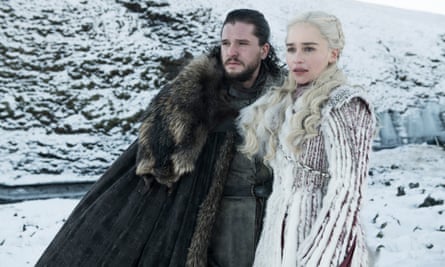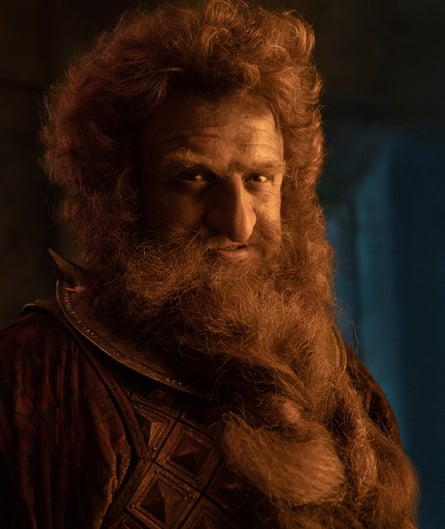‘What is this, famine cosplay?” asked Ed Power in the Irish Times after glimpsing the harfoots wandering around Middle-earth in The Lord of the Rings: The Rings of Power. In the weeks since then, he has been far from the only person to object to these “simpleton proto-hobbits”, who, Power wrote, were “rosy of cheek, slathered in muck, wearing twigs in their hair and speaking in stage-Irish accents that make the cast of Wild Mountain Thyme sound like Daniel Day-Lewis”.
Indeed, Amazon’s multimillion-dollar series has upset just about everybody since it debuted on the streaming platform. You have the Tolkien scholars who say it’s not Tolkien; the anti-Amazon folk who object to the company as a whole and the vast money spent on the series; and those who see the harfoots’ accents as, at worst, clumsy, tone-deaf cultural appropriation and a reinforcement of negative stereotypes. Far less legitimately and more malevolently, you have the uproar about actors of colour being cast in the series. But, considering Amazon’s commitment to that welcome diversification of Middle-earth, the fact that no one in production stopped to consider that Irish people might be upset by the harfoots is especially baffling.
Leith McPherson is the dialect coach on The Rings of Power, and has 25 years’ experience in the field, having worked on Peter Jackson’s Hobbit trilogy among many other films. In various interviews, she has spoken of the research and craft involved in coaching dialect on a project of this scale, and in an interview with Inverse.com she said that the aim was to “make sure an accent doesn’t take [audiences] to their nana’s down the road”. The harfoots, then, speak with “an Irish base to their accent” – but, she continued, they do not speak as if they are from a “particular cross street in Dublin”.
Perhaps it’s that geographic vagueness which forms a large part of the problem. The harfoots being leprechaun-esque nomadic travellers might be viewed less harshly if their accent had a sense of specific place. As it stands, they seem like a crudely drawn cartoon. Lenny Henry’s Dublin-via-Kingston twang aside, I think mainly of Alan Partridge’s audition for the Ireland tourism board every time one of them opens their mouth. “Dere’s more to Middle-earth dan dis,” perhaps? (We contacted McPherson for comment, but Amazon Studios intervened and refused the request.)
In an excellent blog, the academic and author Conrad Brunstrom wrote: “What we’re worried about is that there’s an ‘accent’ that is identified globally as ‘Irish’ that somehow still means ‘primitive’. Since we’ve heard hobbits speak in Peter Jackson movies [without Irish accents], the vague assumption is inculcated that once upon a time the shaggy itinerant harfoots were Irish but they had evolved past that by the Third Age.”
The Rings of Power is far from the only offender, of course. Where, exactly, is Mysaria, Daemon Targaryen’s mistress in House of the Dragon, meant to be from? Sonoya Mizuno, the actor who plays her, was born in Tokyo, raised in Somerset and talks with a British accent. But her character sounds generically eastern-European, Italian or French, depending on whether it’s a vowel or a consonant she’s chewing. I suppose “generically exotic” was the brief.
Even when not done badly, fantasy’s choice of which accents to give its characters is fraught with problems. Harfoots aside, almost everyone else in The Rings of Power talks with a British accent. The elves or high-born men speak in received pronunciation (RP) – also known as southern standard British English, among other names. The jovial but grumpy dwarves are Scottish; they also seem to like a drink, although their views on Irn-Bru and deep-fried food have yet to be disclosed. The evil orcs are cockneys, while the rugged southlanders – gruff, hostile, in need of a good wash – could be from the ginnels of Lancashire.
“It’s lazy,” says Natalie Braber, professor of linguistics at Nottingham Trent university, who specialises in sociolinguistics, the study of accents within a society and its effects on language and identity. “It’s a real quick shortcut.”
She explains how the results of linguistic attitude surveys have barely changed in 60 years, with RP rating consistently high in status, power and intelligence, but low in solidarity, trustworthiness and likability – the three traits Scottish, Irish and north-east English accents have in abundance. “That’s why so many call centres move to those areas,” Braber says. “You call customer services with a complaint, get a lovely Scottish accent and it calms you down.”
In the same studies, certain country accents – south-west of England and East Anglia – score low for intelligence but high for likability, while urban accents from Liverpool and Birmingham generally score low across the board. The real world is one thing, but fantasy is … well, fantasy. The genre should be above reinforcing these harmful tropes.
“Accent is such a huge portion of who we are,” Braber continues. “To mock that, or to use that accent as shorthand for someone who is stupid, or whatever trait it is, is offensive. Irish people have faced discrimination for centuries based on their identity, so I’m not surprised this has caused upset.”
To Braber’s mind, this brings to the fore the fact that accent is not a protected characteristic – something she believes needs to be addressed. “There’s no equality for accents,” she says. “There’s no act that makes it illegal to discriminate against an accent in the same way that it is with age, race, gender or sexuality. That will change very soon, I’m sure of it. For now, it remains immoral, but not illegal.”
It’s unfair to paint The Lord of the Rings: The Rings of Power as the sole offender. British and Irish accents have been used as a default in epic and fantasy TV and film since before Maximus Decimus Meridius.
The Irish accents in the Tom Cruise and Nicole Kidman film Far and Away make The Rings of Power seem tasteful, while Kevin Costner’s twang in Robin Hood: Prince of Thieves is a thing of wonder. Where exactly is the Nottinghamshire he’s thinking of?

Game of Thrones and its prequel, House of the Dragon, just like Braveheart, 300, Spartacus, Rome, The Princess Bride and many more before them, have not been subtle in their use of accent as a signifier of race, class or status (even video games are in on it). Kit Harington, who played GoT’s Jon Snow, speaks with a cut-glass British accent in real life, but the generic Yorkshire accent he adopted to play the Night’s Watch hero came straight from Monty Python’s Four Yorkshiremen sketch. Lacking geographic specificity is one thing, but it was suitably effective in letting viewers the world over know he was different to all those soft southerners in t’King’s t’Landing (in these realms, it’s a given that northerners are tough and will stand for nowt, while southerners are scheming, wine-swilling fops).
Of the voices heard in Game of Thrones and its prequel, author George RR Martin explained it when he said: “It’s full of castles and lords and swords and knights and all the other trappings that we associate with England in this country.”
But, says phonetics expert Prof Jane Setter of Reading university, that doesn’t hold much water. “The Rings of Power and House of the Dragon are both US-made shows, so it is interesting they have reached for these accents again. It’s for authenticity, but it’s inaccurate, nonetheless. People in the 11th century weren’t speaking like Sean Bean, or with modern British standard accents, or indeed anything we might recognise today.”
Interestingly, accents in Peter Jackson’s original Lord of the Rings film trilogy were far less rigid. Of the four hobbits central to the story, none are Irish like their distant ancestors, the harfoots. Elijah Wood’s Frodo speaks with something approaching RP; Samwise (Sean Astin) could be from Somerset; Merry (Dominic Monaghan) and Pippin (Billy Boyd) speak with slightly refined versions of their native Stockport and Glasgow accents. Yet we still believed they were old friends from the Shire. Could it be that viewers are less concerned with whether characters sound the same than studios think they are? Or have issues of identity become that much more pressing since Jackson’s trilogy was released two decades ago?
“The harfoots’ accent is an unfortunate reflection of perceived stereotypes,” says Setter. “It just contributes to the perpetuation of these stereotypes among those watching, or to reactions of the kind we have seen in parts of the media. The series also seems to reflect British colonialism without rejecting it, or questioning the fact that those with a superior role in life should have anything other than RP-type accents. We have diversity in casting, but not in accent.”
Filming for the second series of The Rings of Power is due to start in October, so it will be interesting to see if Amazon responds to criticisms of the harfoots with less cartoonish Irish accents. Maybe they can give us a teetotal Scottish warrior and a northerner with a thorough skincare regime while they are at it.

